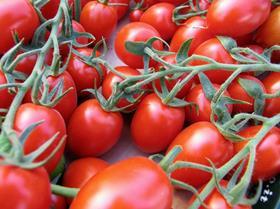
Despite being consumed in bigger volume than almost any other fruit, tomatoes continue to leave many consumers feeling underwhelmed, and sometimes disappointed.
Taste, or a lack of it, was a central theme at Fruitnet’s European Tomato Forum (ETF), which returned to Düsseldorf for its second year on 15 June. It is clear that while there has been a shift in western Europe to smaller, sweeter cocktail varieties, there is still work to be done to improve flavour in the wider category.
Speaking at the conference, Kristin Jürkenbeck of Georg-August University in Göttingen quoted a study showing that 43 per cent of consumers weren’t happy with the taste of the tomatoes they buy. She advised seed companies to place a greater focus on taste to win new consumers, and she told suppliers to communicate a variety’s superior flavour if consistent quality could be guaranteed.
The researcher stressed that along with price and colour, taste was the most important consideration for shoppers, however up until now the storability and shelf life of tomatoes has often taken precedence.
Speaking on developments in the flavour of Spanish tomato varieties, José Manuel Estévez of growers’ co-op La Palma said sweetness was key when developing flavour: “In premium cherry tomatoes you need to increase your Brix from eight to 10 to improve the taste, while in commodity cherry tomatoes you need to improve the Brix from six or seven to eight.” Meanwhile, in large tomatoes, breeders should be aiming to increase Brix levels from four or five to seven or eight, he said.
One way of improving consumers’ taste experience is to ensure they know how to store tomatoes properly – at room temperature rather than in the fridge – as this can help ensure greater customer satisfaction. However, it is also important that suppliers do more to inform consumers about the flavour of their tomatoes, particularly if they are selling a premium product.
“We only really communicate the price and whether tomatoes are organic or not,” said Dr Wouter Verkerke of Wageningen University in the Netherlands. “This is a missed opportunity; we need to think about how we can communicate flavour more on shelf… maybe it would be a good option to have more brands.”
The Dutch researcher spoke about Wageningen’s Flavour Toolbox, which comprises different sensory panels and model predictions of flavour levels. The tools allow for a quick and, as far as possible, objective measurement of flavour levels, not only in tomatoes, but also in sweet peppers, melons and strawberries. “The Flavour Toolbox helps to build trust into our chain because its results represent the voice of consumers,” said Verkerke.
Used by tomato producers across Europe, he pointed out that the university’s sensory panels and model have helped to improve flavour and diversity in the tomato category over the past few years. However, he called for action to reverse a fall in vegetable consumption in many European countries.
“We have to do something with price; we have to improve the ease of eating – snack vegetables are a great opportunity; and we have to give consumers more flavour than in the past,” he said.
French marketer finds middle way
Brittany-based marketer Prince de Bretagne showcased a new range of tomatoes with zero pesticide residues at this year’s European tomato Forum. Sold under the new label ‘100% Nature & Saveurs’, the tomatoes are guaranteed to be grown without the use of pesticides, with producers utilising only organic, non-synthetic plant protection agents in production.
The tomatoes are also guaranteed to contain zero residues, meaning no quantifiable synthetic molecule residues above the recordable limit of 0.01 mg/kg, no contaminants and no risk of banned residues.
“This is a new way because it’s an in-between,” said the company’s head of fresh vegetable products Marine Bougeard. “It’s between conventional and organic agriculture. It means growers produce in the same way as before, in traditional greenhouses, but with organic methods to defend the plants.”
A full range of 100% Nature & Saveurs tomatoes is now on the market in France, including on-the-vine tomatoes, round tomatoes and cocktail tomatoes. Other European countries with strong demand for organics are also being targeted, particularly Germany and parts of northern Europe.
Bougeard’s presentation generated considerable interest among delegates but concerns were raised about the consistency of supply if no pesticides are used, as well as a lack of uniformity in the branding of different companies’ pesticide-free tomatoes, and an expectation among consumers’ that all tomatoes should have zero pesticide residues anyway.



